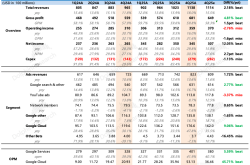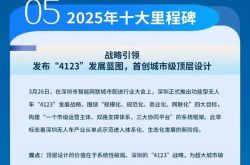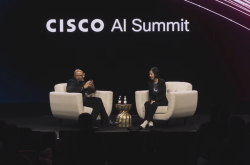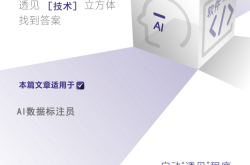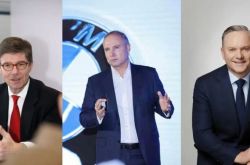Redrawing the "Boundary"! SERES and Huawei Both Want to Avoid Suspicion
![]() 07/09 2024
07/09 2024
![]() 641
641
Layout Design: Eryi
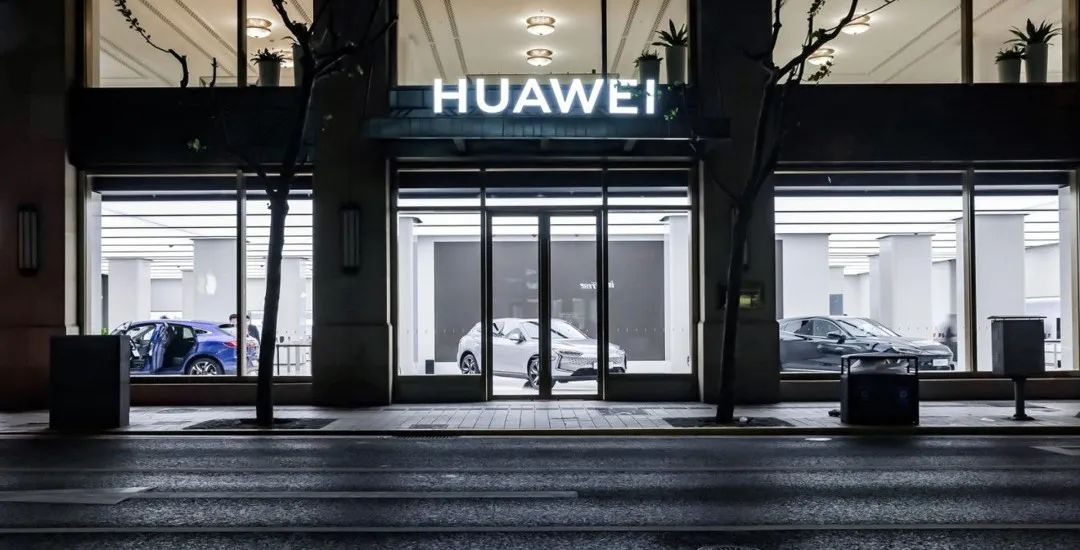

From late last year to early this year, the most significant news and liveliest topics in the automotive industry were almost entirely dominated by Huawei.
From new car sales to delivery speed, from AEB test debates to autonomous parking capabilities, from the launch of the HarmonyOS Intelligent Driving new model to the call for automakers to jointly establish automotive joint ventures... traffic and public opinion seemed to favor only this tech giant crossing over into car manufacturing, "far ahead."
Recently, the auto market has been relatively calm for a while. When everyone was waiting for something new and exciting to happen, the news of Thalys acquiring Wenjie instantly set the automotive industry abuzz.
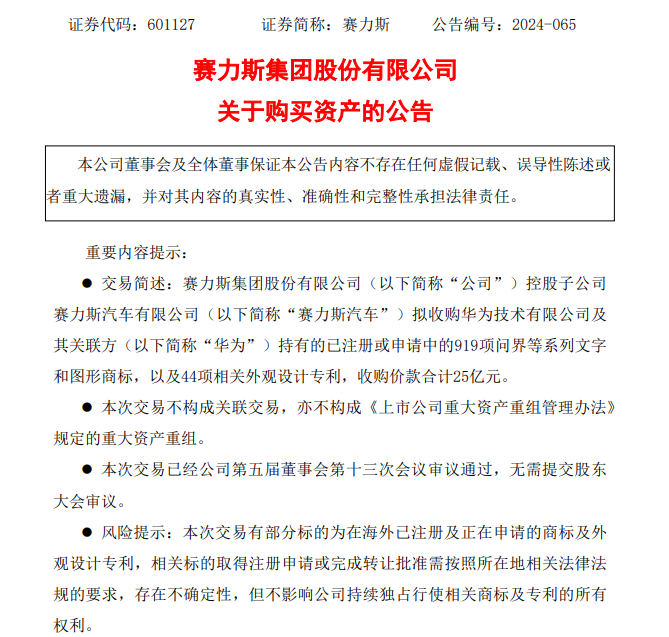
On July 2, Thalys announced its intention to acquire all global "Wenjie" and other related trademark rights and application rights, as well as related design patents held by Huawei for RMB 2.5 billion.
In other words, Wenjie will henceforth belong to Thalys, no longer Huawei Wenjie.
Interestingly, the news of the acquisition of Wenjie was announced after the release of June sales figures, and it came on the heels of HarmonyOS Intelligent Driving topping the new force sales chart for the first half of the year.
It's indeed quite subtle.
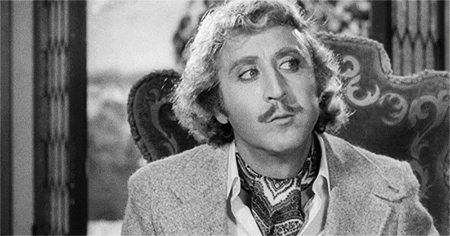
1
Apparent Divergence, Secret Preparation
On the surface, it seems like a split, but both Huawei and Thalys emphasize that their cooperation has deepened further.
Scrutinizing the wording of the announcement—under the premise that the original cooperation framework remains unchanged, both parties will give full play to their respective resources, jointly design and market, and strive to make AITO Wenjie a world-class leading brand of new luxury vehicles.
The emphasis is on the last sentence.
We've known about being a "leading brand of new luxury vehicles" for a while. "World-class"? Isn't that about going overseas?
Regarding the speculation, Thalys did not deny it. In an interview with the media, Thalys stated that this is the beginning of the internationalization of the AITO Wenjie brand.
That's clear enough.
Let's temporarily shift our attention away from this matter.
What is the hottest trend in China's new energy vehicle industry in 2024, or in the past three years?

Going overseas.
In three years, China's automobile exports have surpassed those of South Korea, Germany, and Japan, making it the largest automobile exporter in the world.
China's automobile industry has achieved leapfrog development through new energy reforms, and its overseas advantage also lies in new energy.
Almost all automakers are going overseas, and all new brands are planning to sell new energy vehicles overseas.
Not only to sell, but also to sell at high prices and well, taking the luxury and high-end route.
After all, China's automobile industry has grown stronger, transitioning from a follower to a leader, relying on leading electrification technology and intelligent capabilities, naturally driving up its value.

When it comes to luxury and high-end, the first benchmark is BBA.
Where is BBA's hometown? The distant European continent.
Europe has become the first choice for the first stop in going overseas, directly targeting the high-end stronghold.
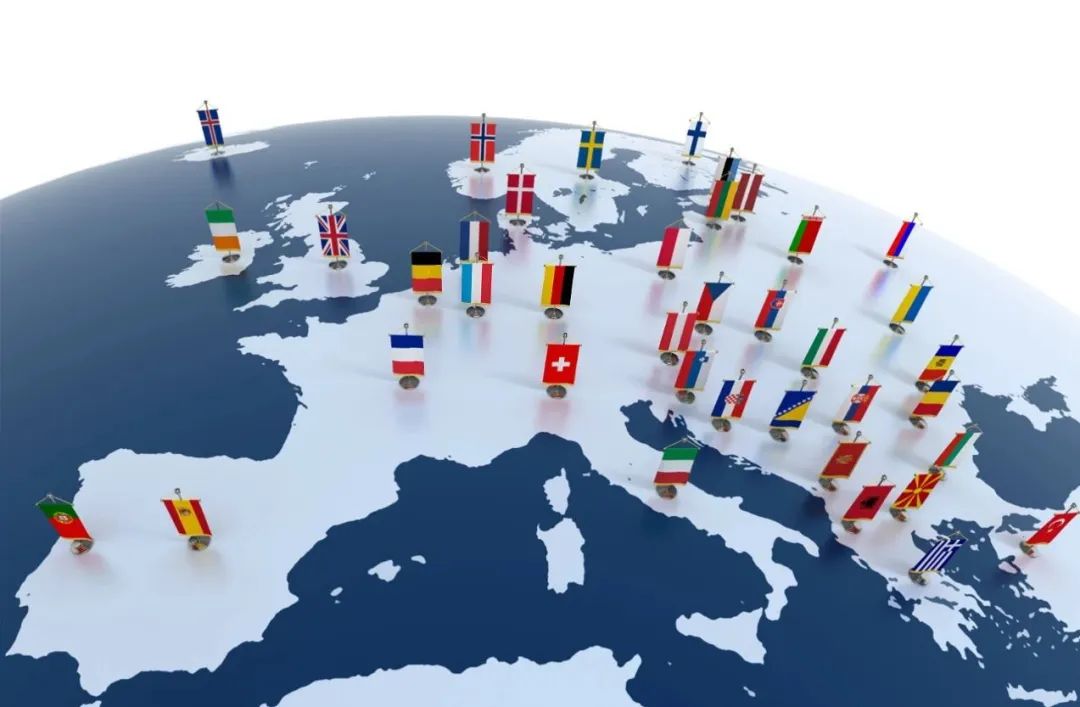
Every domestic new brand aspiring to defeat traditional luxury giants wants to capture this strategic high ground.
Moreover, the results at home have been quite good. High-end domestic new energy vehicles have indeed taken away BBA's market share and forced them to offer steep discounts. If they can successfully replicate this in Europe and capture the hearts of BBA's own people, it would be remarkable.
Counting the domestic luxury brands challenging BBA, each one is ambitious about going overseas.
— NIO (has gone overseas, with Europe as a key market), ZEEKR (has gone overseas, with Europe as the first launch market), LIXIANG (about to go overseas, planning to enter the Middle East first and then Europe)...
And what about Wenjie, the most threatening competitor and the one most feared by BBA, why hasn't it revealed any overseas expansion plans yet?
This brings us back to Wenjie's somewhat complex identity composition.
Involving Huawei, due to a well-known reason, going overseas in this manner might face more force majeure than other automakers.
HarmonyOS Intelligent Driving itself does not have a clear overseas expansion plan, which is related to this special background.
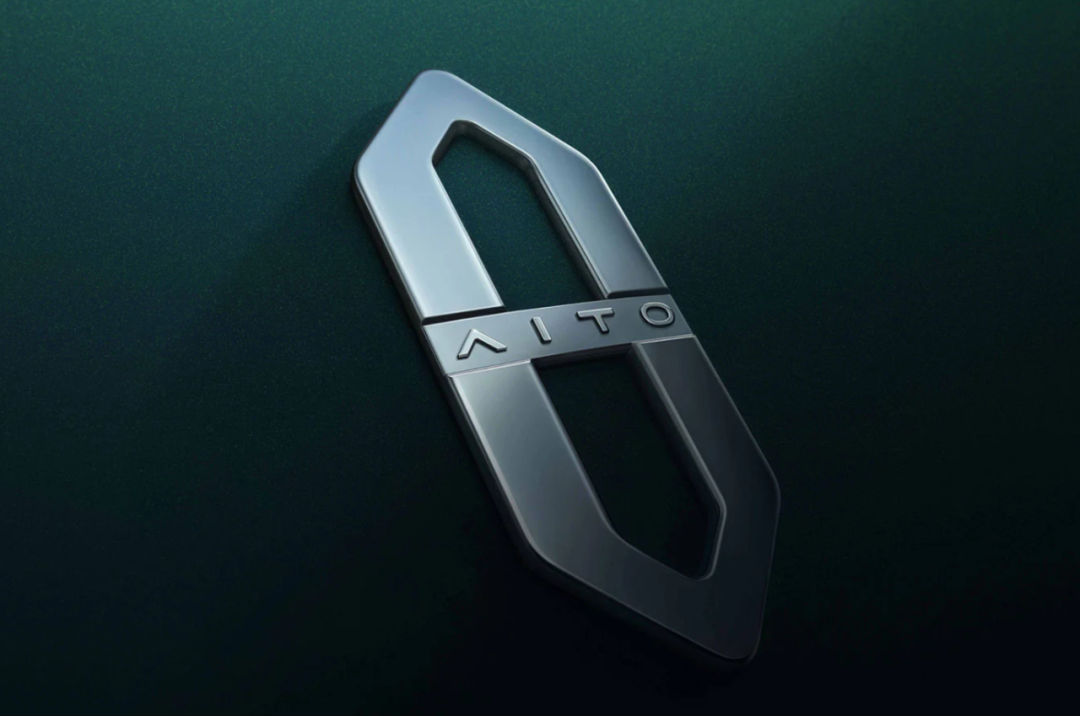
Since Thalys' main sales come from the Wenjie brand models in cooperation with Huawei, if they go overseas, Wenjie, which is deeply tied to Huawei, will inevitably be affected by sanctions, ultimately impacting the effectiveness of overseas expansion.
After acquiring the Wenjie trademark, Thalys will have independent intellectual property rights, making it more secure for the automaker brand to go overseas. Meanwhile, the influence of Huawei as a supplier will be minimized.
The shallower the relationship, the lighter the harm. So even if it's a "beloved child," Huawei has to reluctantly let go.
From the perspective of occupying a broader market, the cooperation between the two has indeed deepened.
The purpose of drawing a clear line is to pave the way for Wenjie's internationalization.
2
Repeated Self-Proving: Huawei Does Not Build Cars
If Thalys considers the impact of overseas expansion on overseas revenue and profits, and wants to avoid suspicion with Huawei, it's understandable. But is it worth it for Huawei to sell Wenjie at a discount and act as a kind-hearted helper just to show its stance of not building cars?
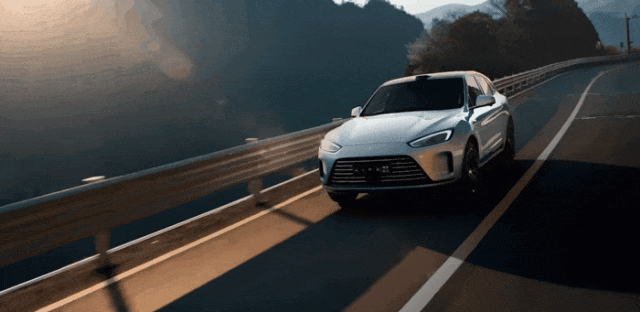
Huawei says that even after transferring Wenjie, it will continue to help Thalys build and sell Wenjie well. It also reiterated that Huawei has consistently adhered to not building cars but rather utilizing leading intelligent connected vehicle technology to continuously help automakers build and sell good cars.
It exudes a sense of humility, loyalty, and sincerity.
In fact, after Ren Zhengfei personally approved the renewal of the no-car-building commitment, "transmitting the chill to everyone," and after the internal debate between the two factions was brought to the forefront, the fact that Huawei does not build cars has become a foregone conclusion. Now it is no longer timely to talk about Yu Chengdong's unwillingness and forced compromises.
The chapter about Huawei wanting to build cars has already been turned, and even Yu Chengdong himself has moved on because there are still HarmonyOS Intelligent Driving's "Four Realms" and the new joint venture company Yinwang waiting for him to attend to.
The focus should not be on what Huawei wanted to do in the past but rather what it wants to do in the future or what it cannot do in the past and present because of what it wants to do in the future.
Based on this consensus, let's understand why Huawei has to emphasize once again at this point that Huawei does not build cars.
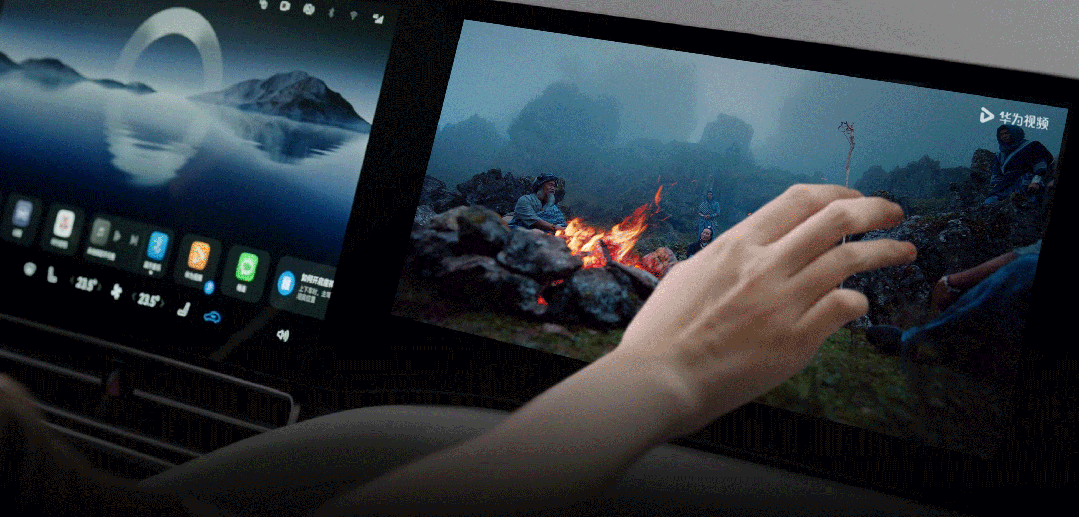
Huawei's positioning in helping automakers build good cars is to be a supplier similar to Bosch. However, due to its non-pure consumer electronics background and sufficient capabilities to build cars on its own, automakers weigh the pros and cons of cooperating with Huawei and believe that the consequences of Huawei stealing their soul are far from being covered by the benefits of cooperation.
As the world's largest automotive supplier, Bosch provides services to numerous automaker partners, with annual revenue exceeding RMB 700 billion. However, the current revenue of Huawei's BU business accounts for less than 1% of its overall revenue.
Under the chill of "reducing or closing businesses that cannot generate value and profit," automakers' unwillingness to cooperate has become the biggest obstacle to "Huawei becoming Bosch."
On the one hand, Huawei is optimizing its existing model. The number of automakers cooperating on the Smart Selection program is limited to four—AITO Wenjie with Thalys, Zhijie with Chery, Xiangjie with Beijing Automotive Group, and Aojie with JAC Motor.

On the other hand, it is exploring other possibilities to win over mainstream automakers. At the end of last year, Huawei signed an agreement with Changan Automobile to establish a new joint venture company named Yinwang engaged in the research, design, production, sales, and service of automotive intelligent systems and component solutions, and encouraged more automakers to participate as shareholders.
It should be said that to date, there are still not many automakers cooperating with Huawei, necessitating Huawei to repeatedly reiterate that it does not build cars.
In fact, before this transfer of the Wenjie trademark, Huawei has already transferred the trademarks of "Zhijie" and "Xiangjie" to Chery and Beijing Automotive Group, respectively. By "repeatedly" taking the most deeply bound and best-selling Wenjie to the chopping block, Huawei aims to demonstrate its determination:
Huawei's only possible back door to building cars has been closed, so please feel free to cooperate.
The reason for using such a big move now, as mentioned earlier, is that this is a great time to go overseas. If Huawei can expand cooperation with more automakers, it may help it quickly grow into a world-class supplier and fundamentally solve various problems related to business scale and revenue.

However, due to Huawei's sanctions by the United States and Europe, the overseas expansion tide has made the already difficult situation of expanding clients even worse. Even Yu Chengdong himself said, "Multinational automakers will not choose us because Huawei is a sanctioned company."
If Huawei doesn't take drastic measures at this time, the disadvantages will accumulate, and it might even disturb the already negotiated cooperation, rendering previous efforts futile.
In addition, letting the unbundled brands go out first to explore and make mistakes will also serve as a reference for other automakers still hesitant about cooperation and going overseas. In particular, the subsequent overseas expansion and situation of the Zhijie brand, which cooperates with the export giant Chery, will be related to Huawei's prospects as an automotive supplier going overseas.
To some extent, Huawei also wants to achieve leapfrog development by taking a detour.

Once the logic is straightened out, the mastermind behind the "divergence" emerges.
Thalys, which has always cooperated most closely with Huawei, is not yet powerful enough to "rebel," and even this "demarcation" is a form of cooperation.
However, Huawei's proactive planning in trademark transfers and its determination to become a Tier 1 supplier indicate that Huawei should be the driving force behind the "demarcation."
Tracing back to why Huawei initially entered the automotive industry, the prerequisite factor was that sanctions from Europe and the United States made it difficult for it to expand its core electronic consumer business. Today, if Huawei can "borrow the shell" of automakers to re-enter Europe and the United States as a reaffirmed automotive supplier, it could also be considered a kind of indirect salvation, closing the loop of the story.
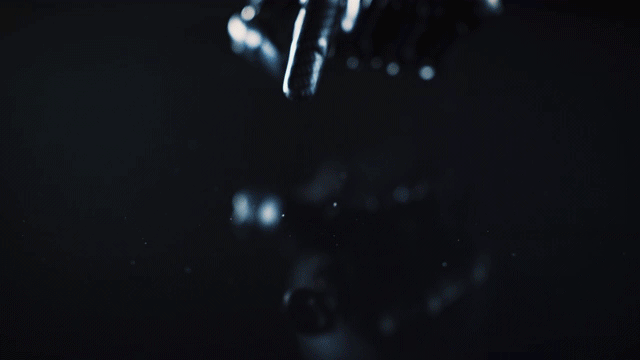
Moreover, with the advent of the AI intelligence era, which not only injects new life into electronic consumption but also sees a rebound in the global smartphone, PC, and tablet markets, Huawei is quickly returning to its peak after enduring the trough. At the same time, the potential release of cloud computing and large models represents the future trend and is more in line with Huawei's identity as a communications technology giant.
Automobiles are just one of Huawei's many businesses, ranked relatively low in importance, and it's not something Huawei has to cling to. As the automotive parts model is opened up, Huawei is also considering gradually withdrawing from the automotive business, so Wenjie can also transform from "the best" to "one of the best."
Perhaps this day was destined to arrive from the start. Helping automakers build and sell good cars is to shake off the dust and go their separate ways.


